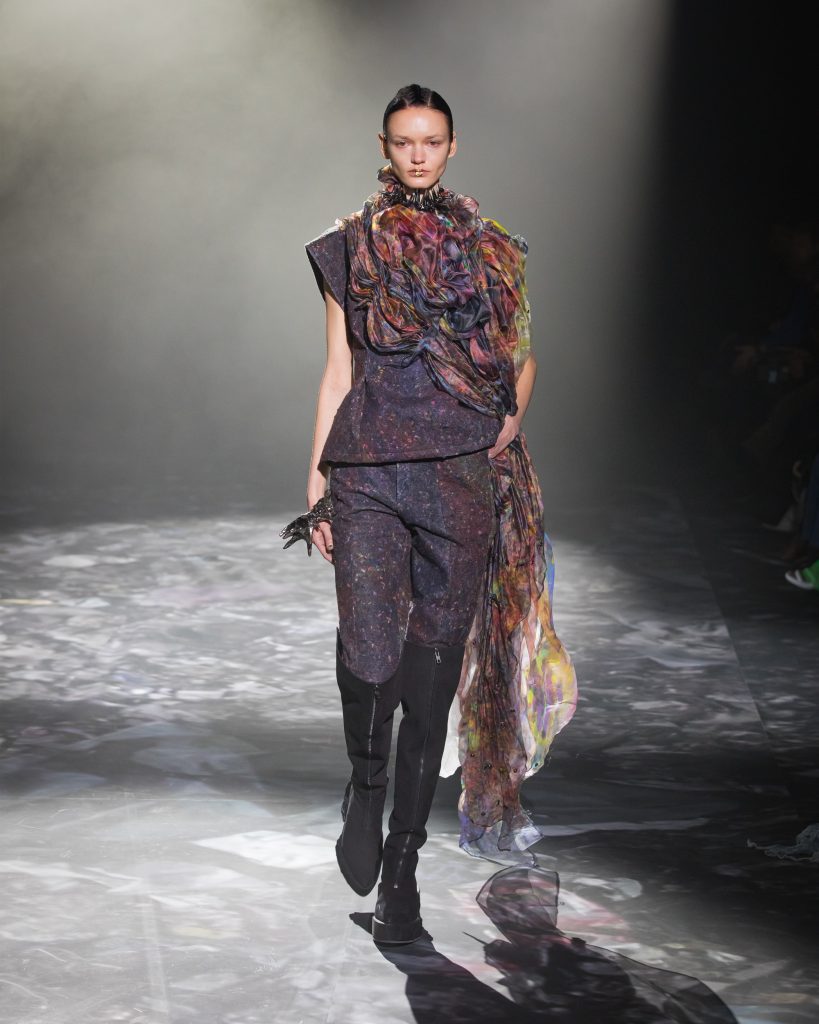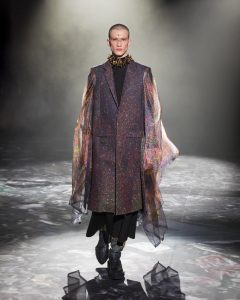
Phil McMullin, Head of Sales, Commercial & Industrial, Epson (UK), discusses how digital print technology is rapidly reshaping the fashion landscape and inspiring the next-generation of designers


Renowned Japanese fashion designer Yuima Nakazato gave a glimpse into fashion future earlier this year by recycling used garments into non-woven fabric before printing onto them using direct-to-fabric print technology
Digital print is fast becoming a fashion essential as designers explore the creative edge and production flexibility the technology delivers.
At this year’s London Fashion Week numerous notable pieces were created with digital print as designers chose to adopt more unique, colourful, and flexible ways to take their inspired work from imagination to catwalk.
For many, the technology gave them the ability to make their designs stand out with personalisation and customisation. They were also able to adapt and change up or switch out ideas with greater immediacy for more dynamic collections.
This was the case for independent avant-garde womenswear brand IA LONDON, which works with carefully selected British digital textile printing specialists to ensure that the deep vibrant colours of the prints last. It uses digital printing for on-demand customisation, a process that reduces wastewater and enables the most efficient use of material, resulting in minimal waste and no unwanted stock. It also supports local manufacturing in the UK to allow faster turnaround times and a smaller logistical carbon footprint.
IA LONDON is not alone in its concern about the environment. Digital printing is perfectly placed to support the creation of sustainable fashion pieces, and compared to traditional textile production, the environmental impact of the waterless, on-demand, responsive and versatile process is greatly reduced. Furthermore, only what is needed is produced, reducing the overproduction and excessive waste that exists with outsourcing fabrics.
Love Hero is another conscious and responsible brand that aims to redefine industry standards and pave the way for a more sustainable and ethical future in fashion. With its upcycled collections, waterless printing practices, and on-demand production processes, it focuses on reducing waste and minimizing raw material consumption. It also prioritises complete product journey transparency through supply chain technology. Its goal is to empower ordinary people to live extraordinary lives by wearing clothing that aligns with their values and makes a positive impact on the planet.
Richard Quinn is no stranger to the power of digital textile printing to create vibrant show stopping garments and his Autumn/Winter 2023 runway show at London Fashion Week was no exception. He has won wide acclaim for his inspirational use of dye-sublimation and dazzled again with yet another display of the colourful vibrance.

Richard Quinn chose to use digital inkjet printing for his secret garden-inspired décor
Quinn also chose to use digital inkjet printing for his secret garden-inspired décor. The scuff and tear-resistant PVC-free polyester floor graphics, which contain 40% recycled material, were printed with water-based inks. The durable solution was recyclable and free from any environmentally harmful substance.
The flexibility and responsiveness of digital print, coupled with its sustainable credentials, allows designers to approach garment design and creation in an exciting new way.
Renowned Japanese fashion designer Yuima Nakazato gave a glimpse into fashion future earlier this year by recycling used garments into non-woven fabric before printing onto them using direct-to-fabric print technology. This circular economy for fashion production combined Epson’s dry fibre technology and Epson’s Monna Lisa digital textile printing technology, another exciting development for this industry.
Key to evangelising print technology as a sustainable change agent within fashion is ensuring it has the right exposure to aspiring young fashion designers. Epson has collaborated with De Montfort University this year to build their education around direct-to-garment technology, an exciting partnership that enabled used t-shirts to see a new lease of life thanks to a digital textile printer. Getting young people to experience this circular economy using on-demand printing is an exciting spectacle into the future of fashion, and we’re excited to see how the students will bring this to the catwalk.











